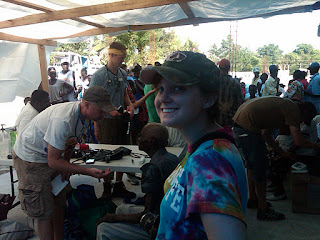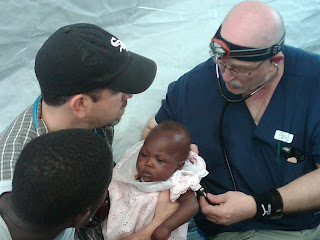Well, within a couple of years of my conversion to Christ, I became introduced to a Reformed understanding of Scripture. The Reformed confession, The Westminster Confession of Faith (WCF), speaks very clearly about how "Christian Liberty" is to function in the Christian life. Gal. 5:1 says that "it's for freedom that Christ has set us free." And the WCF Chapter 20, Sec. 2 says this:
God alone is Lord of the conscience, and hath left it free from the doctrines and commandments of men, which are, in anything, contrary to his Word; or beside it, if matters of faith, or worship. So that, to believe such doctrines, or to obey such commands, out of conscience, is to betray true liberty of conscience: and the requiring of an implicit faith, and an absolute and blind obedience, is to destroy liberty of conscience, and reason also.
Do you see what the penners of the WCF were saying? God is the Lord of conscience and men's consciences must not be bound by: a) anything that is against Scripture or b) anything that might be "beside" Scripture. In other words, we must not bind men's consciences to anything that is "anti-Biblical" or "extra-Biblical." I sense that Evangelicals have often gotten "a" but lost sight of "b," that to bind men's consciences to extra-Biblical teachings can be just as damaging as requiring them to follow anti-Biblical teachings. What is the teaching, "wine and beer are always bad"? Here's the answer: extra-Biblical teaching!
Well, there's a long and tortured history regarding why it is that evangelical Christians stood so strongly against alcohol consumption of any kind, and they were in large part due to the social reforms of the 2nd Great Awakening and revivalistic and conservative Christianity's alignment with Prohibition all the way through the 1920s (in 1918, what would become the failed experiment of Prohibition, became codified into law). As Richard Lovelace comments, these changes that worked towards the "reforming of society" seemed logical at the time but were "not necessarily biblical" (see my previous blogpost here).
Lovelace even states that in the history of the Church, huge tendencies towards such legalistic tendencies resulted from a doctrinal loss, where the Church lost sight of the glorious Reformation (and Scriptural) doctrine of "Justification by Faith" and began teaching instead "Justification by Sanctification" (also see this previous post: Partial Disenculturation).
So what was it that I could see as an "outsider to Christianity" up until the point of my conversion? I could see that many Christians stood strongly against alcohol consumption of any kind, sometimes using the "my body is a temple" argument but then didn't have any problem with over-eating or gossip or general mean-spiritedness or other sin patterns. What was that all about? Well, Rose Marie Miller once said that legalism and lawlessness are really two sides of the same coin, living life in one own's strength (according to the "flesh" as the Bible describes). And what you often see is people vacillating from irreligious living to getting "religion." But their lives never seem to change and be transformed on a foundational level. Why not? Because as Miller says, "flesh cannot control flesh." So we go from trying "really hard" to saying "forget it" as far as the "righteous life of Christ goes." Why? Because the Christian life cannot be lived in one's own strength; instead, must be empowered by the power of the Spirit or "living by the Spirit" as Paul says (Gal. 5:16). Evangelicals have often sought to make the Gospel about moral reform while non-Evangelicals have had a tendency to say, "I don't need God," but either way whether religious or irreligious, life has been sought in autonomy from the risen Christ, and I know God has so much more for us. The inconsistencies in the Church were at times palpable. I was reminded early on that the Apostle Peter was right, that "judgment must begin with the household of God" (1Pet 4:17). How many Christians are empowered by "life in the Spirit" and manifest the peaceable fruits of Christ (Gal. 5:22)? How many Christians know and love the Word, so that their "arguments" come from the very lifeblood of Scripture itself rather than are merely cultural ones? How many Christians know what they believe about Scripture's teachings on these matters and are rooted deeply in the power of the Word and what it says, not necessarily what cultural movements among Christians have said? Did you know that the Bible says "beer is good"?
Tanya and I started Grace Chapel when we were 29-year-olds. We are both now forty. When I was younger, I wasn't always sure if I said things in order to get a rise out of people or because the Holy Spirit had led me to say them. I've always sought to submit my preaching to the leading of the Holy Spirit, but as a young man, how do you know? How much of my preaching was about Mike Hsu vs. being about Christ? I remember I said in a sermon when I was 29, that "when I drink Bud Lite, I do it to the glory of God." Here's the thing, I don't like Bud Lite that much because it is bad beer, but my point was that "eating and drinking" serve one primary purpose in life and that purpose is "for the glory of God" (1Cor. 10:31). If I think it's OK with God to drink Bud Lite (which I do), well then I have one option and that's to do it for the glory of God. I remember an older lady got right up at that point in the sermon and walked out of the doors never to return to Grace Chapel again. That shakes a preacher, especially a young preacher. Well, I'm a little older and wiser these days, and I've often reflected on what I said that day, and I continue to be glad I said it, because the Church needs to grapple with the life that Christ has for us in the Spirit and in submission to His Word. The Lord is indeed the Lord of conscience, and I'm so glad He leads us in His power and by His Spirit.
Here's the thing: I like beer. In fact, I've had the pleasure the last two nights of making "black and tans" for my dad and me (above, I've posted a picture of one of them). I've made two different types- last night I made one with Guinness on top and Hoegaarden on the bottom (delicious) and tonight with Guinness on top and Bass on the bottom (really good too). Dad and I have enjoyed the fellowship and laughter and beer has been a blessing. For that I give God thanks. I've not yet read this book, but I've heard great things about it. It's a serious book called The Search for God and Guinness published by Christian publisher Thomas Nelson, and I hear it's a great book. As Douglas Wilson has said, "Put this book in a frosty glass and enjoy":
One final note, I've taught some about the question of the "weaker brother" spoken of in 1Cor. 8. I have a brochure at Grace Chapel called "Christian Liberty" and unfortunately haven't made it into the 21st century yet by putting it on an electronic file. But basically, I find Scripture to have a kind of flexibility to addressing sin issues in a person's life, based on precisely what those sin issues are. So for example, Paul says to the Galatians that "if you let yourselves be circumcised, Christ will be of no value to you" (Gal. 5:2). Why does he say that? Well, Paul says that because the Galatians struggled with legalism and making circumcision a part of the "salvation equation," adding the Jewish works of the law to their justification. But also notice that Paul is very comfortable circumcising Timothy for the sake of the Gospel's movement among a Jewish people (Acts 16:3). Was Paul contradicting himself? The answer was "no" but rather using his Christian liberty to help the Gospel's movement into peoples' lives. The Corinthians struggled with lawlessness, so abstinence from certain practices of eating meat sacrificed to idols made a lot of sense among other believers who had come out of such normative pagan-associated practices and might be tempted to turn back to such an empty way of life. It would be a bit like a Christian choosing to abstain from a beer when having dinner with a good brother who had a history of alcoholism. However, in other cases where alcohol abstention is thought to be the lot of the "righteous" and "religious" (where legalism instead of lawlessness is the shape of sin), it might make sense to expose such legalism by "having a glass of wine in the Spirit" and displaying the life of freedom purchased for us by Christ. In fact, didn't Jesus Himself do this in the midst of the Pharisees, to the point of receiving much criticism from them (Matt. 11:19)? Well, this is a long post about beer, so just like my wonderful 22 oz. glass of black and tan I enjoyed with dad this evening,... I'm finished.

















































